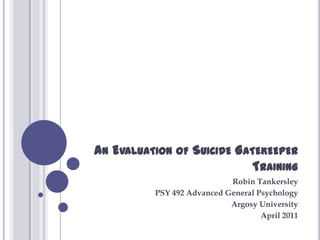
The Effectiveness Of Suicide Gatekeeper Training
- 1. An Evaluation of Suicide Gatekeeper Training Robin Tankersley PSY 492 Advanced General Psychology Argosy University April 2011
- 2. Abstract This review explores several published studies that report on results from research conducted on the effectiveness of gatekeeper suicide training. With gatekeepers being people within the community who have the most contact with potentially suicidal youth, they have the greatest chance of identifying suicidal behavior, particularly when it comes to friends and family members. Because timing is so important when targeting suicidal youth, it is important to be properly trained about the signs and proper way to get involved if a friend or loved one is suicidal. Additionally we need to be certain about the effectiveness of gatekeeper training programs because there is so much at stake. This review looks at QPR (Question, Persuade and Refer) training. It addresses various measures of self-efficacy, an increase in overall knowledge regarding suicide education and prevention and an increase in talking with suicidal adolescents about their suicidal ideation showing that there is a correlation between gatekeeper training and an increase in knowledge and skills.
- 3. What is a Gatekeeper? A person who regularly comes into contact with an individual or family in crisis. “Professionals” “Regular” people within the community Teachers & other school personnel Clergy Law enforcement Primary health care providers Mental health care workers Emergency health care personnel (Goldsmith, Pellmar, Kleinman & Bunney, 2002) Community center workers Employees at non-profits Librarians Staff at after-school programs Resident-assistants (RAs) Friends Family members (Gatekeepers suggested by author)
- 4. Why is this Important? Approximately 30,000 deaths are by completed suicide each year in the US Suicide rate continues to exceed the homicide rate by 40% annually Suicide remains the third leading cause of death in youth 15-24 (Goldsmith et al., 2008)
- 5. But What can be done? Early identification and intervention to target suicidal at-risk youth Train gatekeepers to recognize the signs of suicidal ideation and intervene asking the question “Are you having suicidal thoughts?”
- 6. The Question is… Are gatekeeper training programs are an effective training method to increase knowledge about suicide, increasing self-efficacy and positively changing attitudes about suicide to create an environment where an adult feels comfortable approaching a potentially suicidal youth and asking them the question “Are you having suicidal thoughts?”
- 7. QPR Training Q-Question P-Persuade R-Refer Similar to CPR, QPR teaches intervention strategies to help detect, intervene and refer a suicidal person to a trained professional for help by Questioning the validity of suicidal communication and then Persuading and Referring someone at risk to seek professional help. (Quinnett, 2007)
- 8. Research Findings The prevailing arguments regarding the effectiveness of gatekeeper training programs indicate that gatekeeper training programs are effective in reducing negative beliefs about mental health and suicide (Cartmill et al., 2009) while simultaneously increasing self-efficacy and perceived knowledge which was retained for a minimum period of at least six months (Keller et al., 2009; Chagnon et al., 2007; Quinnet, 2007) and some sources report retention of some programs of up to three years (Goldsmith, 2002). Training has been proven to positively impact skills, attitudes and knowledge of those trained in many settings—community centers, classrooms, sports programs, church youth groups, even on the streets (Issac, et al., 2009) and even though the method of delivery varied (QPR, SOAR, modified QPR), the results stayed the same.
- 9. Future Research Should analyze the effectiveness of gatekeeper training programs focusing on participant’s perceived knowledge and self-efficacy while comparing participant’s educational levels and prior knowledge of suicide statistics and intervention strategies.
- 10. References Cartmill, T., Deane, F., & Coralie, W. (2009). Gatekeeper training for youth workers: Impact on their help-seeking and referral skills. Youth Studies Australia, 28(1), 5-12. Chagnon, F., Houle, J., Marcous, I., & Renaud, J. (2007). Control-group study of an intervention training program for youth suicide prevention. Suicide and Life-Threatening Behavior, 37(2), 135-144. Goldsmith, S. K., Pellmar, T. C., Kleinman, A. M., Bunney, W. E. (Eds.). (2002). Reducing suicide: a national imperative. Washington, D.C.: The National Academies Press. Isaac, M., Elias, B., Katz, L.Y., Belik, S. L., Deane F. P., Enns M.W., et al. (2009). Gatekeeper training as a preventative intervention for suicide: A systematic review. Canadian Journal of Psychiatry, 54(4), 260-268. Keller, D. P., Schut, L. J. A., Puddy, R. W., Williams, L., Stephens, R. L., McKeon, R., et al. (2009). Tennessee Lives Count: Statewide gatekeeper training for youth suicide prevention. Professional Psychology: Research and Practice, 40(2), 126–133.
- 11. References King, K. & Smith, J. (2000). Project SOAR: A training program to increase school counselors’ knowledge and confidence regarding suicide prevention and intervention. Journal of School Health, 70(1), 402-407. Quinnett, P. (2007). QPR Gatekeeper Training for Suicide Prevention: The Model, Rationale and Theory. Spokane, WA: QPR Institute. Reis, C., & Cornell, D. (2008). An Evaluation of Suicide Gatekeeper Training for School Counselors and Teachers. Professional School Counseling, 11(6), 386-394. Stuart, C., Waalen, J. K., & Haelstromm, E. (2003). Many helping hearts: An evaluation of peer gatekeeper training in suicide risk assessment. Death Studies, 27(4), 321-333. Tompkins, T. L., & Witt, J. (2009). The short-term effectiveness of a suicide prevention gatekeeper training program in a college setting with residence life advisers. The Journal of Primary Prevention, 30(2), 131-149.